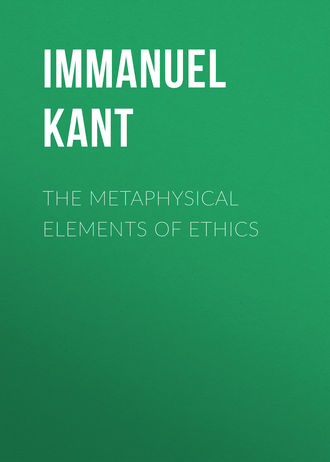 полная версия
полная версияThe Metaphysical Elements of Ethics
B. OF CONSCIENCE
Similarly, conscience is not a thing to be acquired, and it is not a duty to acquire it; but every man, as a moral being, has it originally within him. To be bound to have a conscience would be as much as to say to be under a duty to recognize duties. For conscience is practical reason which, in every case of law, holds before a man his duty for acquittal or condemnation; consequently it does not refer to an object, but only to the subject (affecting the moral feeling by its own act); so that it is an inevitable fact, not an obligation and duty. When, therefore, it is said, "This man has no conscience," what is meant is that he pays no heed to its dictates. For if he really had none, he would not take credit to himself for anything done according to duty, nor reproach himself with violation of duty, and therefore he would be unable even to conceive the duty of having a conscience.
{INTRODUCTION ^paragraph 145}
I pass by the manifold subdivisions of conscience, and only observe what follows from what has just been said, namely, that there is no such thing as an erring conscience. No doubt it is possible sometimes to err in the objective judgement whether something is a duty or not; but I cannot err in the subjective whether I have compared it with my practical (here judicially acting) reason for the purpose of that judgement: for if I erred I would not have exercised practical judgement at all, and in that case there is neither truth nor error. Unconscientiousness is not want of conscience, but the propensity not to heed its judgement. But when a man is conscious of having acted according to his conscience, then, as far as regards guilt or innocence, nothing more can be required of him, only he is bound to enlighten his understanding as to what is duty or not; but when it comes or has come to action, then conscience speaks involuntarily and inevitably. To act conscientiously can, therefore, not be a duty, since otherwise it would be necessary to have a second conscience, in order to be conscious of the act of the first.
The duty here is only to cultivate our conscience, to quicken our attention to the voice of the internal judge, and to use all means to secure obedience to it, and is thus our indirect duty.
C. OF LOVE TO MEN
{INTRODUCTION ^paragraph 150}
Love is a matter of feeling, not of will or volition, and I cannot love because I will to do so, still less because I ought (I cannot be necessitated to love); hence there is no such thing as a duty to love. Benevolence, however (amor benevolentiae), as a mode of action, may be subject to a law of duty. Disinterested benevolence is often called (though very improperly) love; even where the happiness of the other is not concerned, but the complete and free surrender of all one's own ends to the ends of another (even a superhuman) being, love is spoken of as being also our duty. But all duty is necessitation or constraint, although it may be self-constraint according to a law. But what is done from constraint is not done from love.
It is a duty to do good to other men according to our power, whether we love them or not, and this duty loses nothing of its weight, although we must make the sad remark that our species, alas! is not such as to be found particularly worthy of love when we know it more closely. Hatred of men, however, is always hateful: even though without any active hostility it consists only in complete aversion from mankind (the solitary misanthropy). For benevolence still remains a duty even towards the manhater, whom one cannot love, but to whom we can show kindness.
To hate vice in men is neither duty nor against duty, but a mere feeling of horror of vice, the will having no influence on the feeling nor the feeling on the will. Beneficence is a duty. He who often practises this, and sees his beneficent purpose succeed, comes at last really to love him whom he has benefited. When, therefore, it is said: "Thou shalt love thy neighbour as thyself," this does not mean, "Thou shalt first of all love, and by means of this love (in the next place) do him good"; but: "Do good to thy neighbour, and this beneficence will produce in thee the love of men (as a settled habit of inclination to beneficence)."
The love of complacency (amor complacentiae,) would therefore alone be direct. This is a pleasure immediately connected with the idea of the existence of an object, and to have a duty to this, that is, to be necessitated to find pleasure in a thing, is a contradiction.
{INTRODUCTION ^paragraph 155}
D. OF RESPECT
Respect (reverentia) is likewise something merely subjective; a feeling of a peculiar kind not a judgement about an object which it would be a duty to effect or to advance. For if considered as duty it could only be conceived as such by means of the respect which we have for it. To have a duty to this, therefore, would be as much as to say to be bound in duty to have a duty. When, therefore, it is said: "Man has a duty of self-esteem," this is improperly stated, and we ought rather to say: "The law within him inevitably forces from him respect for his own being, and this feeling (which is of a peculiar kind) is a basis of certain duties, that is, of certain actions which may be consistent with his duty to himself." But we cannot say that he has a duty of respect for himself; for he must have respect for the law within himself, in order to be able to conceive duty at all.
XIII. General Principles of the Metaphysics of Morals in the treatment of Pure Ethics
{INTRODUCTION ^paragraph 160}
First. A duty can have only a single ground of obligation; and if two or more proof of it are adduced, this is a certain mark that either no valid proof has yet been given, or that there are several distinct duties which have been regarded as one.
For all moral proofs, being philosophical, can only be drawn by means of rational knowledge from concepts, not like mathematics, through the construction of concepts. The latter science admits a variety of proofs of one and the same theorem; because in intuition a priori there may be several properties of an object, all of which lead back to the very same principle. If, for instance, to prove the duty of veracity, an argument is drawn first from the harm that a lie causes to other men; another from the worthlessness of a liar and the violation of his own self-respect, what is proved in the former argument is a duty of benevolence, not of veracity, that is to say, not the duty which required to be proved, but a different one. Now, if, in giving a variety of proof for one and the same theorem, we flatter ourselves that the multitude of reasons will compensate the lack of weight in each taken separately, this is a very unphilosophical resource, since it betrays trickery and dishonesty; for several insufficient proofs placed beside one another do not produce certainty, nor even probability. They should advance as reason and consequence in a series, up to the sufficient reason, and it is only in this way that they can have the force of proof. Yet the former is the usual device of the rhetorician.
Secondly. The difference between virtue and vice cannot be sought in the degree in which certain maxims are followed, but only in the specific quality of the maxims (their relation to the law). In other words, the vaunted principle of Aristotle, that virtue is the mean between two vices, is false.5 For instance, suppose that good management is given as the mean between two vices, prodigality and avarice; then its origin as a virtue can neither be defined as the gradual diminution of the former vice (by saving), nor as the increase of the expenses of the miserly. These vices, in fact, cannot be viewed as if they, proceeding as it were in opposite directions, met together in good management; but each of them has its own maxim, which necessarily contradicts that of the other.
{INTRODUCTION ^paragraph 165}
For the same reason, no vice can be defined as an excess in the practice of certain actions beyond what is proper (e.g., Prodigalitas est excessus in consumendis opibus); or, as a less exercise of them than is fitting (Avaritia est defectus, etc.). For since in this way the degree is left quite undefined, and the question whether conduct accords with duty or not, turns wholly on this, such an account is of no use as a definition.
Thirdly. Ethical virtue must not be estimated by the power we attribute to man of fulfilling the law; but, conversely, the moral power must be estimated by the law, which commands categorically; not, therefore, by the empirical knowledge that we have of men as they are, but by the rational knowledge how, according to the ideas of humanity, they ought to be. These three maxims of the scientific treatment of ethics are opposed to the older apophthegms:
{INTRODUCTION ^paragraph 170}
1. There is only one virtue and only one vice.
2. Virtue is the observance of the mean path between two opposite vices.
3. Virtue (like prudence) must be learned from experience.
XIV. Of Virtue in General
{INTRODUCTION ^paragraph 175}
Virtue signifies a moral strength of will. But this does not exhaust the notion; for such strength might also belong to a holy (superhuman) being, in whom no opposing impulse counteracts the law of his rational will; who therefore willingly does everything in accordance with the law. Virtue then is the moral strength of a man's will in his obedience to duty; and this is a moral necessitation by his own law giving reason, inasmuch as this constitutes itself a power executing the law. It is not itself a duty, nor is it a duty to possess it (otherwise we should be in duty bound to have a duty), but it commands, and accompanies its command with a moral constraint (one possible by laws of internal freedom). But since this should be irresistible, strength is requisite, and the degree of this strength can be estimated only by the magnitude of the hindrances which man creates for himself, by his inclinations. Vices, the brood of unlawful dispositions, are the monsters that he has to combat; wherefore this moral strength as fortitude (fortitudo moralis) constitutes the greatest and only true martial glory of man; it is also called the true wisdom, namely, the practical, because it makes the ultimate end of the existence of man on earth its own end. Its possession alone makes man free, healthy, rich, a king, etc., nor either chance or fate deprive him of this, since he possesses himself, and the virtuous cannot lose his virtue.
All the encomiums bestowed on the ideal of humanity in its moral perfection can lose nothing of their practical reality by the examples of what men now are, have been, or will probably be hereafter; anthropology which proceeds from mere empirical knowledge cannot impair anthroponomy which is erected by the unconditionally legislating reason; and although virtue may now and then be called meritorious (in relation to men, not to the law), and be worthy of reward, yet in itself, as it is its own end, so also it must be regarded as its own reward.
Virtue considered in its complete perfection is, therefore, regarded not as if man possessed virtue, but as if virtue possessed the man, since in the former case it would appear as though he had still had the choice (for which he would then require another virtue, in order to select virtue from all other wares offered to him). To conceive a plurality of virtues (as we unavoidably must) is nothing else but to conceive various moral objects to which the (rational) will is led by the single principle of virtue; and it is the same with the opposite vices. The expression which personifies both is a contrivance for affecting the sensibility, pointing, however, to a moral sense. Hence it follows that an aesthetic of morals is not a part, but a subjective exposition of the Metaphysic of Morals; in which the emotions that accompany the force of the moral law make the that force to be felt; for example: disgust, horror, etc., which gives a sensible moral aversion in order to gain the precedence from the merely sensible incitement.
{INTRODUCTION ^paragraph 180}
XV. Of the Principle on which Ethics is separated from Jurisprudence
This separation on which the subdivision of moral philosophy in general rests, is founded on this: that the notion of freedom, which is common to both, makes it necessary to divide duties into those of external and those of internal freedom; the latter of which alone are ethical. Hence this internal freedom which is the condition of all ethical duty must be discussed as a preliminary (discursus praeliminaris), just as above the doctrine of conscience was discussed as the condition of all duty.
{INTRODUCTION ^paragraph 185}
REMARKS
Of the Doctrine of Virtue on the Principle Of Internal Freedom.
Habit (habitus) is a facility of action and a subjective perfection of the elective will. But not every such facility is a free habit (habitus libertatis); for if it is custom (assuetudo), that is, a uniformity of action which, by frequent repetition, has become a necessity, then it is not a habit proceeding from freedom, and therefore not a moral habit. Virtue therefore cannot be defined as a habit of free law-abiding actions, unless indeed we add "determining itself in its action by the idea of the law"; and then this habit is not a property of the elective will, but of the rational will, which is a faculty that in adopting a rule also declares it to be a universal law, and it is only such a habit that can be reckoned as virtue. Two things are required for internal freedom: to be master of oneself in a given case (animus sui compos) and to have command over oneself (imperium in semetipsum), that is to subdue his emotions and to govern his passions. With these conditions, the character (indoles) is noble (erecta); in the opposite case, it is ignoble (indoles abjecta serva).
{INTRODUCTION ^paragraph 190}
XVI. Virtue requires, first of all, Command over Oneself
Emotions and passions are essentially distinct; the former belong to feeling in so far as this coming before reflection makes it more difficult or even impossible. Hence emotion is called hasty (animus praeceps). And reason declares through the notion of virtue that a man should collect himself; but this weakness in the life of one's understanding, joined with the strength of a mental excitement, is only a lack of virtue (Untugend), and as it were a weak and childish thing, which may very well consist with the best will, and has further this one good thing in it, that this storm soon subsides. A propensity to emotion (e.g., resentment) is therefore not so closely related to vice as passion is. Passion, on the other hand, is the sensible appetite grown into a permanent inclination (e. g., hatred in contrast to resentment). The calmness with which one indulges it leaves room for reflection and allows the mind to frame principles thereon for itself; and thus when the inclination falls upon what contradicts the law, to brood on it, to allow it to root itself deeply, and thereby to take up evil (as of set purpose) into one's maxim; and this is then specifically evil, that is, it is a true vice.
Virtue, therefore, in so far as it is based on internal freedom, contains a positive command for man, namely, that he should bring all his powers and inclinations under his rule (that of reason); and this is a positive precept of command over himself which is additional to the prohibition, namely, that he should not allow himself to be governed by his feelings and inclinations (the duty of apathy); since, unless reason takes the reins of government into its own hands, the feelings and inclinations play the master over the man.
{INTRODUCTION ^paragraph 195}
XVII. Virtue necessarily presupposes Apathy (considered as Strength)
This word (apathy) has come into bad repute, just as if it meant want of feeling, and therefore subjective indifference with respect to the objects of the elective will; it is supposed to be a weakness. This misconception may be avoided by giving the name moral apathy to that want of emotion which is to be distinguished from indifference. In the former, the feelings arising from sensible impressions lose their influence on the moral feeling only because the respect for the law is more powerful than all of them together. It is only the apparent strength of a fever patient that makes even the lively sympathy with good rise to an emotion, or rather degenerate into it. Such an emotion is called enthusiasm, and it is with reference to this that we are to explain the moderation which is usually recommended in virtuous practices:
{INTRODUCTION ^paragraph 200}
Insani sapiens nomen ferat, aequus uniqui
Ultra quam satis est virtutem si petat ipsam.6
{INTRODUCTION ^paragraph 205}
For otherwise it is absurd to imagine that one could be too wise or too virtuous. The emotion always belongs to the sensibility, no matter by what sort of object it may be excited. The true strength of virtue is the mind at rest, with a firm, deliberate resolution to bring its law into practice. That is the state of health in the moral life; on the contrary, the emotion, even when it is excited by the idea of the good, is a momentary glitter which leaves exhaustion after it. We may apply the term fantastically virtuous to the man who will admit nothing to be indifferent in respect of morality (adiaphora), and who strews all his steps with duties, as with traps, and will not allow it to be indifferent whether a man eats fish or flesh, drink beer or wine, when both agree with him; a micrology which, if adopted into the doctrine of virtue, would make its rule a tyranny.
REMARK
{INTRODUCTION ^paragraph 210}
Virtue is always in progress, and yet always begins from the beginning. The former follows from the fact that, objectively considered, it is an ideal and unattainable, and yet it is a duty constantly to approximate to it. The second is founded subjectively on the nature of man which is affected by inclinations, under the influence of which virtue, with its maxims adopted once for all, can never settle in a position of rest; but, if it is not rising, inevitably falls; because moral maxims cannot, like technical, be based on custom (for this belongs to the physical character of the determination of will); but even if the practice of them become a custom, the agent would thereby lose the freedom in the choice of his maxims, which freedom is the character of an action done from duty.
ON_CONSCIENCE
ON CONSCIENCE
The consciousness of an internal tribunal in man (before which "his thoughts accuse or excuse one another") is CONSCIENCE.
Every man has a conscience, and finds himself observed by an inward judge which threatens and keeps him in awe (reverence combined with fear); and this power which watches over the laws within him is not something which he himself (arbitrarily) makes, but it is incorporated in his being. It follows him like his shadow, when he thinks to escape. He may indeed stupefy himself with pleasures and distractions, but cannot avoid now and then coming to himself or awaking, and then he at once perceives its awful voice. In his utmost depravity, he may, indeed, pay no attention to it, but he cannot avoid hearing it.
Now this original intellectual and (as a conception of duty) moral capacity, called conscience, has this peculiarity in it, that although its business is a business of man with himself, yet he finds himself compelled by his reason to transact it as if at the command of another person. For the transaction here is the conduct of a trial (causa) before a tribunal. But that he who is accused by his conscience should be conceived as one and the same person with the judge is an absurd conception of a judicial court; for then the complainant would always lose his case. Therefore, in all duties the conscience of the man must regard another than himself as the judge of his actions, if it is to avoid self-contradiction. Now this other may be an actual or a merely ideal person which reason frames to itself. Such an idealized person (the authorized judge of conscience) must be one who knows the heart; for the tribunal is set up in the inward part of man; at the same time he must also be all-obliging, that is, must be or be conceived as a person in respect of whom all duties are to be regarded as his commands; since conscience is the inward judge of all free actions. Now, since such a moral being must at the same time possess all power (in heaven and earth), since otherwise he could not give his commands their proper effect (which the office of judge necessarily requires), and since such a moral being possessing power over all is called GOD, hence conscience must be conceived as the subjective principle of a responsibility for one's deeds before God; nay, this latter concept is contained (though it be only obscurely) in every moral self-consciousness.
THE END1
One who is acquainted with practical philosophy is not, therefore, a practical philosopher. The latter is he who makes the rational end the principle of his actions, while at the same time he joins with this the necessary knowledge which, as it aims at action, must not be spun out into the most subtile threads of metaphysic, unless a legal duty is in question; in which case meum and tuum must be accurately determined in the balance of justice, on the principle of equality of action and action, which requires something like mathematical proportion, but not in the case of a mere ethical duty. For in this case the question is not only to know what it is a duty to do (a thing which on account of the ends that all men naturally have can be easily decided), but the chief point is the inner principle of the will namely that the consciousness of this duty be also the spring of action, in order that we may be able to say of the man who joins to his knowledge this principle of wisdom that he is a practical philosopher.
2
Man, however, as at the same time a moral being, when he considers himself objectively, which he is qualified to do by his pure practical reason, (i.e. according to humanity in his own person), finds himself holy enough to transgress the law only unwillingly; for there is no man so depraved who in this transgression would not feel a resistance and an abhorrence of himself, so that he must put a force on himself. It is impossible to explain the phenomenon that at this parting of the ways (where the beautiful fable places Hercules between virtue and sensuality) man shows more propensity to obey inclination than the law. For, we can only explain what happens by tracing it to a cause according to physical laws; but then we should not be able to conceive the elective will as free. Now this mutually opposed self-constraint and the inevitability of it makes us recognize the incomprehensible property of freedom.
3
The less a man can be physically forced, and the more he can be morally forced (by the mere idea of duty), so much the freer he is. The man, for example, who is of sufficiently firm resolution and strong mind not to give up an enjoyment which he has resolved on, however much loss is shown as resulting therefrom, and who yet desists from his purpose unhesitatingly, though very reluctantly, when he finds that it would cause him to neglect an official duty or a sick father; this man proves his freedom in the highest degree by this very thing, that he cannot resist the voice of duty.
4
So that one might vary two well-known lines of Haller thus:
{INTRODUCTION ^paragraph 100}
With all his failings, man is stillBetter than angels void of will.5
The common classical formulae of ethics- medio tutissimus ibis; omne mimium vertitur in vitium; est modus in rebus, etc., medium tenuere beati; virtus est medium vitiorum et utrinque reductum- ["You will go most safely in the middle" (Virgil); "Every excess develops into a vice"; "There is a mean in all things, etc." (Horace); "Happy they who steadily pursue a middle course"; "Virtue is the mean between two vices and equally removed from either" (Horace).] – contain a poor sort of wisdom, which has no definite principles; for this mean between two extremes, who will assign it for me? Avarice (as a vice) is not distinguished from frugality (as a virtue) by merely being the latter pushed too far; but has a quite different principle (maxim), namely placing the end of economy not in the enjoyment of one's means, but in the mere possession of them, renouncing enjoyment; just as the vice of prodigality is not to be sought in the excessive enjoyment of one's means, but in the bad maxim which makes the use of them, without regard to their maintenance, the sole end.









